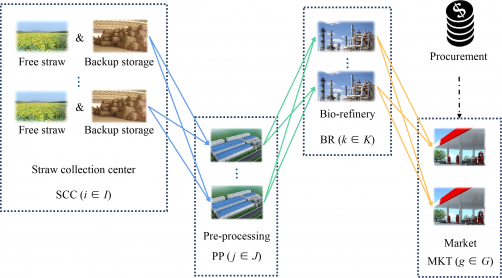Science
Researchers Enhance Resilience of Biofuel Supply Chains Amid Disruptions

Researchers from Tianjin University have unveiled a novel approach to strengthen biofuel supply chains against disruptions. Their study, titled “Optimization Design Method for Biofuel Resilient Supply Chain Considering Node Disruption Impacts in a Two-Stage Stochastic Programming Framework,” is published in the journal Frontiers of Chemical Science & Engineering, Volume 19, Issue 6. This research addresses the increasing complexities and uncertainties faced by businesses in the biofuel sector as economic globalization accelerates.
The study highlights the urgent need for robust supply chain designs that can endure disruptions without compromising security and competitiveness. Current methods often fall short in quantifying and evaluating the risks associated with supply chain disruptions, leaving companies vulnerable to unpredictable events. To tackle this challenge, the researchers developed an improved Node Disruption Impact Index, which incorporates adjustable parameters. This index assesses cost fluctuations due to disruptions at different nodes along the supply chain.
Addressing Supply Chain Risks with Innovative Tools
The newly proposed index enables businesses to identify nodes with varying risk levels, offering a systematic way to evaluate disruption impacts. The adjustable parameters allow enterprises to customize the tool according to their specific needs, facilitating a balance between economic benefits and resilience.
Furthermore, the research introduces a two-stage stochastic programming model designed to optimize supply chain performance in the face of uncertainties. This model integrates a mechanism to address potential high disruption risks, providing a more comprehensive approach to supply chain management.
To validate their model, the researchers applied it to a biofuel supply chain case study in Guangdong Province. The findings reveal that the proposed model significantly outperforms traditional models, particularly when faced with disruptions at high-risk nodes. In terms of cost management and market delivery rates, the new method demonstrates superior effectiveness.
Implications for the Future of Biofuel Supply Chains
The implications of this research extend beyond theoretical frameworks. By equipping businesses with innovative tools to manage risks effectively, it contributes to the development of more resilient biofuel supply chains. This is essential not only for maintaining production levels but also for enhancing overall market stability in an increasingly volatile economic landscape.
For those interested in further details, the full paper is accessible at: Frontiers of Chemical Science & Engineering. This study marks a significant step forward in addressing the challenges of biofuel supply chain management and sets the groundwork for future research in this critical area.
-

 Science1 week ago
Science1 week agoInventor Achieves Breakthrough with 2 Billion FPS Laser Video
-

 Top Stories2 weeks ago
Top Stories2 weeks agoCharlie Sheen’s New Romance: ‘Glowing’ with Younger Partner
-

 Entertainment2 weeks ago
Entertainment2 weeks agoDua Lipa Aces GCSE Spanish, Sparks Super Bowl Buzz with Fans
-

 Business2 weeks ago
Business2 weeks agoTyler Technologies Set to Reveal Q3 Earnings on October 22
-

 Entertainment2 weeks ago
Entertainment2 weeks agoMother Fights to Reunite with Children After Kidnapping in New Drama
-

 Entertainment2 weeks ago
Entertainment2 weeks agoRed Sox’s Bregman to Become Free Agent; Tigers Commit to Skubal
-

 World2 weeks ago
World2 weeks agoR&B Icon D’Angelo Dies at 51, Leaving Lasting Legacy
-

 Science2 weeks ago
Science2 weeks agoNorth Carolina’s Biotech Boom: Billions Invested in Manufacturing
-

 Health2 weeks ago
Health2 weeks agoCurium Group, PeptiDream, and PDRadiopharma Launch Key Cancer Trial
-

 Health2 weeks ago
Health2 weeks agoNorth Carolina’s Biotech Boom: Billions in New Investments
-

 Health2 weeks ago
Health2 weeks agoCommunity Unites for 7th Annual Into the Light Walk for Mental Health
-

 Top Stories2 weeks ago
Top Stories2 weeks agoDisney+ Launches Chilling Classic ‘Something Wicked’ Just in Time for October









